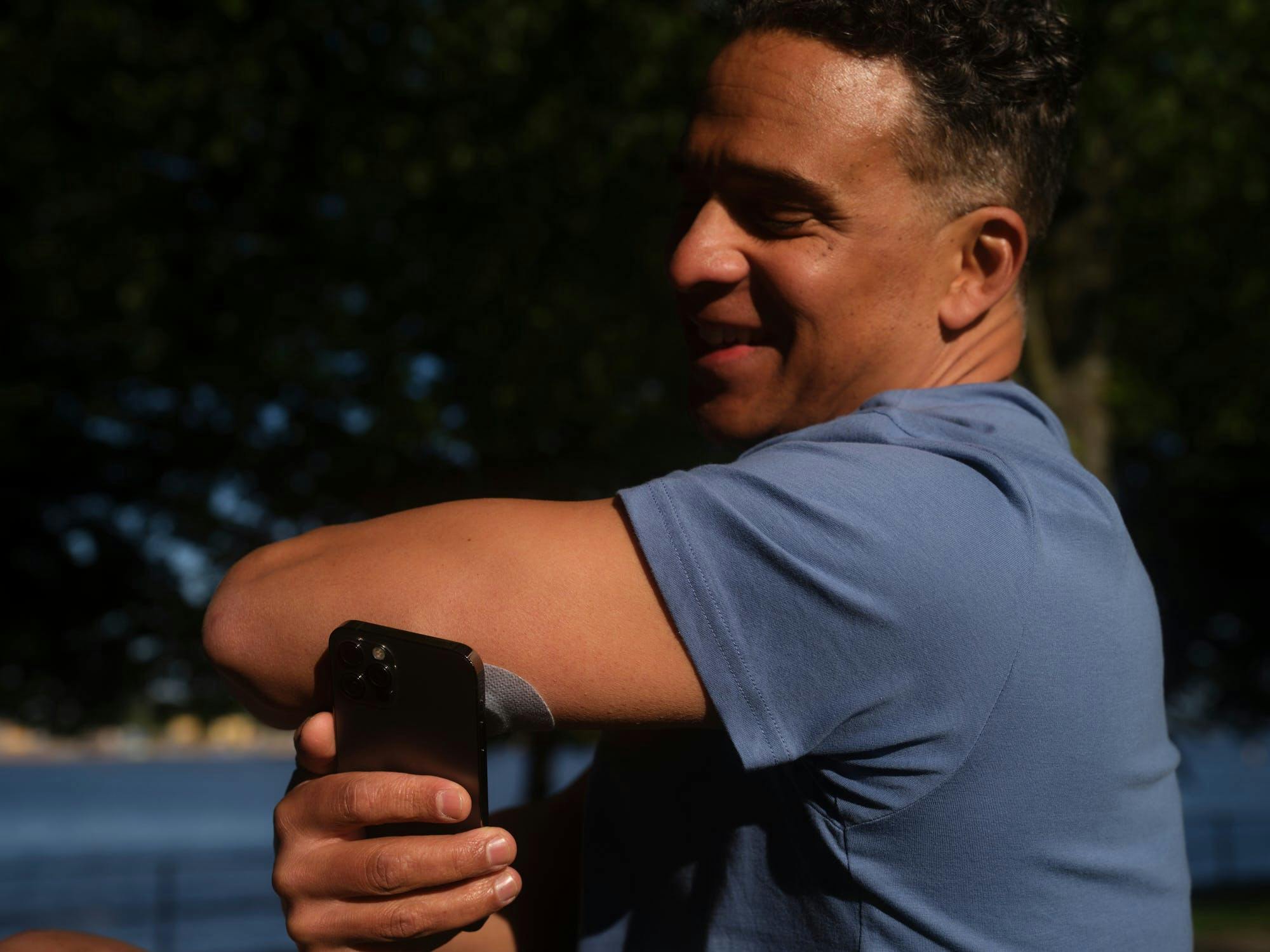You’re not alone if you experience that all-too-familiar afternoon slump.
A 2020 survey of 2,000 Americans revealed that nearly half reported feeling tired as early as 12pm [1].
That drop in energy levels and trouble focusing seems to be inevitable after lunch, but is it? Besides grabbing a second coffee (which might affect your sleep), what else can you do to fight the midday fatigue, or better, to prevent it?
Why are you so tired at work?
Let’s first explore the science behind why you’re feeling sluggish in the afternoon.
Non-physical fatigue, or central fatigue (i.e., the foggy brain and sleepiness you might experience while you’re at work), happens when your brain’s motor coordination center (basal ganglia), executive center (frontal lobe), and “smart control” centers (hypothalamus and limbic system) fail to communicate with each other properly.
Central fatigue can be triggered or worsened by a number of factors, including:
- lack of movement and exercise,
- blood glucose crashes, and
- poor sleep, among other factors.
Working in an office, or even from a laptop at home, is a recipe for greater central fatigue since you’re likely sitting down for the majority of your morning, eating a big meal, and then sitting back down.
In fact, studies have found that office workers tend to spend between 65-75% of their day sitting, and researchers in 2020 learned that those who sit for more than 91% of the workday feel more tired than those who sit less than 75% of the time [2, 3].
This chronically sedentary lifestyle can set off a domino effect that negatively impacts your sleep and even induces insulin resistance (where the hormone insulin, which unlocks cells so they can turn glucose into energy, doesn’t work properly) [4, 5]. In the long run, this can set you up for bigger glucose spikes and crashes when you eat, which can further disrupt your sleep, insulin sensitivity, and energy levels.
The impact of glucose on your energy levels
But why does eating lunch (or a mid-day meal) tend to trigger such a large dip in energy?
Research shows that fluctuations in your blood glucose contribute to central fatigue [6]. Blood glucose measures how much sugar is circulating in your blood, and blood glucose levels naturally fluctuate throughout the day. Healthy blood glucose ranges are:
- Fasting: < 100mg/dL
- Postprandial (after a meal): < 120mg/dL
- Post-meal glucose increase: < 30mg/dL
Abnormal fasting blood glucose levels are surprisingly common, even in people with normal body weight. As discussed earlier, working in an office promotes a sedentary lifestyle, which can have a negative impact on sleep and insulin sensitivity — leading to greater baseline fatigue and glucose dysregulation.
A study on diabetes patients found that the more sedentary their lifestyle, the more time they’d spend in a hyperglycemic state — which can lead to a crash and increased fatigue [7]. If you’re eating a meal that’s rich in carbs and processed ingredients, you’re going to experience an even bigger crash.
On top of that, researchers have found that up to 45% of employees reportedly don’t eat breakfast [8]. Skipping breakfast, which is also known as the “second meal effect,” results in a higher blood sugar rise after lunch — studies have consistently demonstrated this phenomenon in both metabolically healthy people and people with diabetes [9, 10].
How does this work? In response to eating, the release of insulin is greater in the morning [11]. Compared to people who had breakfast before lunch, people who fasted until lunch had significantly higher blood glucose levels after lunch.
While this could be partially explained by the bigger lunch as a result of skipping breakfast, another study showed that even when consuming the same number of calories, people still had a higher blood glucose response to lunch and dinner when they skipped breakfast [12].
4 tips to avoid the post-lunch slump
Now we know that sleepiness after lunch is related to fluctuations in blood sugar, which contribute to inflammation and poor cognitive functions. Keeping your blood glucose at an optimum level can efficiently fuel your brain to conquer mentally challenging tasks. Regardless, it’s not fun to drive the productivity train when you can barely keep your eyes open. So how can you avoid the post-lunch glucose roller coaster?
1. Eat a balanced lunch
Consider a lunch with complex carbohydrates, protein, and healthy fats, with a focus on protein and fats. Fat and fiber from complex carbohydrates can help blunt glucose spikes, and protein helps keep you feeling full.
Studies [13] [14] have shown that carbohydrate-rich meals are better consumed in the morning among people with impaired glucose tolerance, so try to eat more of your carbs at breakfast, when you’re more insulin sensitive [15].
2. Take a walk after lunch
This isn’t to say you can’t ever have carbs at lunch — just be strategic about it. Research has shown that an after-meal walk of even 15 minutes can help lower glucose spikes [16]. Any other mild exercise like easy cycling can work well, too. Exercising after meals can also increase insulin sensitivity, ensuring the circulating glucose is picked up by cells and converted into energy [17].
3. Avoid skipping breakfast
Consider eating something in the early part of the day to prevent you from being overly hungry at lunch and to help stabilize your blood glucose.
A review of a series of studies in 2016 found that eating breakfast (as opposed to skipping it) resulted in improved glucose response during the day, and suggested consuming plenty of whole grains and fiber to minimize glucose spikes [18].
On the other hand, a separate cross-sectional study from 2021 found that eating protein in the morning is linked to greater cardiometabolic health and can help regulate the hunger hormone ghrelin to keep you feeling full for longer [19, 20].
4. Get some quality sleep
While this might be easier said than done, lack of sleep can do a lot of damage to metabolic health. Even one poor night of sleep can throw your hunger and satiety hormones out of whack and has been shown to reduce your insulin response to glucose [21, 22].
In addition, non-insulin-dependent glucose utilization, such as the uptake of glucose by skeletal muscles, can also be reduced by 30% [23]. Sticking to a consistent sleep schedule, which means going to bed and waking up at the same time every day, can help improve insulin sensitivity and decrease the risk of insulin resistance and other cardiometabolic conditions.
Key Takeaways
Feeling sleepy after eating is completely normal, and there are simple things you can do to reverse, or better yet, prevent the post-lunch slump. Here are some takeaways to keep in mind:
- The feeling of mental exhaustion, or central fatigue, is related to the rise and dip of blood glucose after lunch.
- Skipping breakfast and poor sleep can exaggerate this blood glucose swing.
- A big glucose spike (> 30mg/dl) may contribute to oxidative stress and poor cognitive functions.
- Eat a lunch that's filled with complex carbohydrates, quality protein, and healthy fats.
- If time allows, take a walk after eating to help lower blood glucose.
- Try to eat breakfast. You might feel more in control when eating lunch if you eat something in the morning. In addition, breakfast can also stabilize your blood glucose after lunch.
- Get some quality sleep to improve glycemic control.
References:
- https://swns-research.medium.com/surprising-number-of-americans-feel-tired-as-early-as-noon-b2065f5fb92d
- https://www.ncbi.nlm.nih.gov/pmc/articles/PMC5769488/
- https://www.ncbi.nlm.nih.gov/pmc/articles/PMC7558581/
- https://pubmed.ncbi.nlm.nih.gov/27830446/
- https://www.ncbi.nlm.nih.gov/pmc/articles/PMC2596308/
- https://journals.plos.org/plosone/article?id=10.1371/journal.pone.0073697
- https://www.ncbi.nlm.nih.gov/pmc/articles/PMC4755926/
- https://pubmed.ncbi.nlm.nih.gov/34478879/
- https://journals.physiology.org/doi/full/10.1152/ajpendo.00127.2009
- https://journals.physiology.org/doi/full/10.1152/ajpendo.00244.2011
- https://www.ncbi.nlm.nih.gov/pmc/articles/PMC1633483/
- https://pubmed.ncbi.nlm.nih.gov/26220945/
- https://pubmed.ncbi.nlm.nih.gov/25724569/
- https://pubmed.ncbi.nlm.nih.gov/22176632/
- https://academic.oup.com/jcem/article/99/9/E1666/2537471
- https://pubmed.ncbi.nlm.nih.gov/20029518/
- https://doi.org/10.1152/japplphysiol.00123.2005
- https://www.ncbi.nlm.nih.gov/pmc/articles/PMC4863265/
- https://pubmed.ncbi.nlm.nih.gov/33583662/
- https://pubmed.ncbi.nlm.nih.gov/19820013/
- https://journals.plos.org/plosmedicine/article?id=10.1371/journal.pmed.0010062
- https://pubmed.ncbi.nlm.nih.gov/8338493
- https://pubmed.ncbi.nlm.nih.gov/10543671/


